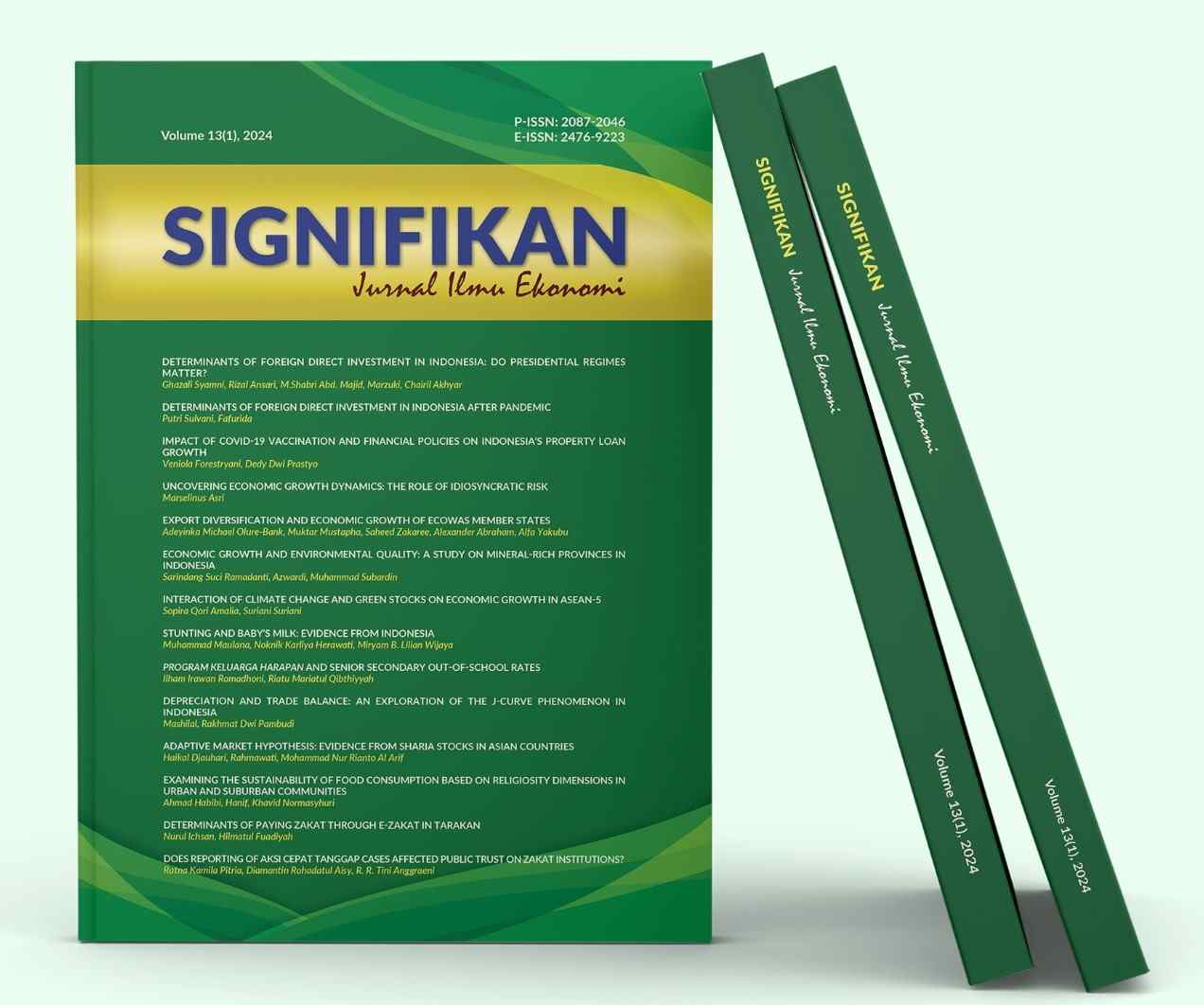Determinants of Paying Zakat Through E-Zakat in Tarakan
DOI:
https://doi.org/10.15408/sjie.v13i1.40942Keywords:
zakat digital payment, theory of acceptance model, theory of planned behaviorAbstract
Research Originality: The existence of adequate infrastructure, especially in the Tarakan City area, makes the author utilize the integration of the conceptual approaches of the Technology Acceptance Model and the Theory of Planned
Research Objectives: This study aims to analyze the influence of variables from the Technology Acceptance Model (TAM) theory and the Theory of Planned Behavior (TPB) on the interest in paying zakat, infaq, and alms through e-zakat.
Research Methods: This study uses primary data from the distribution of questionnaires using the purposive sampling method with 111 respondents who are Muslim and domiciled in Tarakan City. The research method is the Structural Equation Model (SEM) Partial Least Square (PLS) approach.
Empirical Results: The results obtained that attitudes and behavioral control have a significant influence on the interest in use, while the perception of usefulness, perception of ease, and subjective norms do not have a significant influence on the interest in paying zakat, infaq, and alms through e -zakat.
Implications: The community still feels comfortable and easy to pay ZIS directly and the presence of people close to them or the surrounding environment has not fully provided confidence to the Muslim community of Tarakan City to use e-zakat as a payment service.
JEL Classification: H71, H76, Q53
References
Ahmad, R. A. R., Othman, A. M. A., & Salleh, M. S. (2015). Assessing the Satisfaction Level of Zakat Recipients towards Zakat Management. Procedia Economics and Finance, 31, 140-151. https://doi.org/ 10.1016/s2212-5671(15)01141-7
Ahmed, E., & Ward, R. (2016). A Comparison of Competing Technology Acceptance Models to Explore Personal, Academic and Professional Portfolio Acceptance Behavior. Journal of Computers in Education, 3(2), 169–191.
Al Arif, M. N. R., Nofrianto., & Fasa, M. I. (2023). The Preference of Muslim Young Generation in Using Digital Zakat Payment: Evidence in Indonesia. Al Uqud: Journal of Islamic Economics, 7(1), 1-16.
Al Athar, M. D., & Al Arif, M. N. R. (2021). The Intention of Millenial Generation in Paying Zakat Through Digital Payments. Internasional Journal of Islamic Busienss and Economics, 5(1), 38-47.
Anindya, A. S., & Pimada, L. M. (2023). An Indonesia Experience: Does Zakat Enhance Macroeconomic Variables? International Journal of Zakat, 8(1), 25–42.
Ascarya., & Yumanita, D. (2018). Analisis Rendahnya Pengumpulan Zakat Di Indonesia dan Alternatif Solusinya. Working Paper Bank Sentral Indonesia, 9, 21.
Ascarya, A. (2022). The Role of Islamic Social Finance During Covid-19 Pandemic in Indonesia’s Economic Recovery. International Journal of Islamic and Middle Eastern Finance and Management, 15(2), 386–405. https://doi.org/10.1108/IMEFM-07-2020-0351.
Astuti, W., & Prijanto, B. (2021). Faktor yang Memengaruhi Minat Muzaki dalam Membayar Zakat Melalui Kitabisa.com: Pendekatan Technology Acceptance Model dan Theory of Planned Behavior. Al-Muzara’Ah, 9(1), 21–44.
Beik, I. S., Swandaru, R., & Rizkiningsih, P. (2021). Utilization of Digital Technology for Zakat Development. In. Billah, M. M. (Ed). Islamic Fintech. Cham: Palgrave Macmillan.
Cheng E. W. (2019). Choosing between the Theory of Planned Behavior (TPB) and the Technology Acceptance Model (TAM). Educational Technology Research and Development, 67, 21–37. https://doi.org/10.1007/s11423-018-9598-6.
Ghozali, I. (2021). Partial Least Square Konsep, Teknik dan Aplikasi Menggunakan Program SmartPLS 3.2.9 Untuk Penelitian Empiris (3rd ed.). Semarang: Badan Penerbit Universitas Diponegoro.
Haffizha, R. A., & Laksamana, R. (2023). Faktor Penyebab Kurangnya Minat Masyarakat dalam Membayar Zakat di Badan Amil Zakat Nasional (BAZNAS) Provinsi Kalimantan Barat (Pontianak). Prosiding Seminar Nasional Program Studi Ekonomi Islam, 1, 332–340.
Hassan, N. M. (2015). Do Capital Assistance Programs by Zakat Institutions Help the Poor?. Procedia Economics and Finance, 31, 551-562. https://doi.org/10.1016/s2212-5671(15)01201-0
Hidayat, A., & Mukhlisin, M. (2020). Analisis Pertumbuhan Zakat Pada Aplikasi Zakat Online Dompet Dhuafa. Jurnal Ilmiah Ekonomi Islam, 6(3), 675. https://doi.org/10.29040/jiei.v6i3.1435.
Hudaefi, F. A., Caraka, R. E., & Wahid, H. (2022). Zakat Administration in Times of COVID-19 Pandemic in Indonesia: A Knowledge Discovery via Text Mining. International Journal of Islamic and Middle Eastern Finance and Management, 15(2), 271–286. https://doi.org/ 10.1108/IMEFM-05-2020-0250.
Jamaludin, N., & Aminah, S. (2021). Efektifitas Digitalisasi Penghimpunan Dana Zakat pada Badan Amil Zakat Nasional (BAZNAS) Kota Tangerang. Management of Zakat and Waqf Journal (MAZAWA), 2(2), 180–208. https://doi.org/10.15642/mzw.2021.2.2.180-208.
Mahmood, T. M. A. T., Din, N. M., Al Mamun, A., & Ibrahim, M. D. (2021). Issues and Challenges of Zakat Institutions Achieving Maqasid Syariah in Malaysia. AZKA International Journal of Zakat & Social Finance, 119–137. https://doi.org/ 10.51377/azjaf.vol2no1.46
Masrurah, S. (2019). Efektifitas Penyaluran Zakat, Infak Sedekah Melaui Aplikasi Online.Jurnal Andi Djemma Jurnal Pendidikan, 2(1), 90–96.
Mawardi, I., Widiastuti, T., Al Mustofa, M.U. and Hakimi, F. (2023). Analyzing the Impact of Productive Zakat on the Welfare of Zakat Recipients. Journal of Islamic Accounting and Business Research, 14(1), 118-140. https://doi.org/ 10.1108/JIABR-05-2021-0145.
Muneeza, A., & Nadwi, S. (2019). The Potential of Application of Technology- Based Innovations for Zakat Administration in India. International Journal of Zakat, 4(2), 87–100. https://doi.org/10.37706/ijaz.v4i2.191
Nashwan, S. A., Abdul-Jabbar, H., Aziz, S. A., & Sarea, A. (2021). Zakah Compliance in Muslim Countries: An Economic and Socio-Psychological Perspective. Journal of Financial Reporting and Accounting, 19(3), 392–411. https://doi.org/10.1108/JFRA-03-2020-0057.
Prakarsa, T., Shahrullah, R. S., & Seroja, T. D. (2022). Efektivitas Pengelolaan Zakat Badan Amil Zakat Nasional. USM Law Review, 5(2), 738-753.
Saad, R. A., & Haniffa, R. (2014). Determinants of Zakat (Islamic Tax) Compliance Behavior. Journal of Islamic Accounting and Business Research, 5(2), 182-193. https://doi.org/10.1108/JIABR-10-2012-0068.
Sakka, A. R., & Qulub, L. (2019). Efektivitas Penerapan Zakat Online terhadap Peningkatan Pembayaran Zakat pada Lembaga Dompet Dhuafa Sulsel. Al- Azhar Journal of Islamic Economics, 1(2), 66–83.
Shuaib, A. A., & Sohail, M. (2022). The Role of Islamic Social Finance in Societal Welfare: A Case Study of Selected IFBOs in Southwest Nigeria. International Journal of Islamic and Middle Eastern Finance and Management, 15(1), 83–99. https://doi.org/10.1108/IMEFM-06-2019-0229.
Wahyudi, R., & Pambudi, D. S. (2022). Digital Zakat Payment: User Experience of Islamic Bank in Indonesia. At-Taqaddum, 14(2), 61-70.

